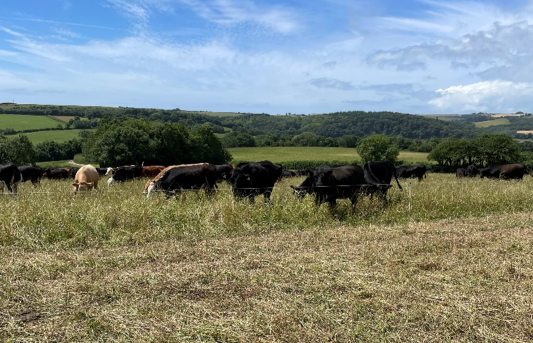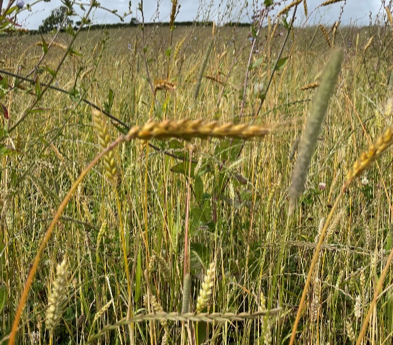
A Farm Net Zero event held at Erth Barton Demonstration Farm
A large group of farmers met at Erth Barton to see the progress that Farm Net Zero Demonstration Farmer Tim Williams has made since the launch event in October 2021. The main topics of the farm walk were the adaptive multi-paddock grazing system and the pasture cropping arable. This event was made possible with thanks to the National Lottery Community Fund who fund the Farm Net Zero project.
The first stop on the tour was to see the adaptive multi-paddock grazing in action. Tim is grazing 150 dairy beef cattle, moving them three times a day in paddocks of half a hectare, these cattle are currently growing at 1-1.5kg a day from pasture alone. The pasture is a highly diverse herbal ley, allowed to grow long. The frequency of movement and paddock size are responsive to the rate of grass growth, hence the name “adaptive multi-paddock grazing”. Tim’s main aim is to rejuvenate the soil by adding organic matter from trampled plants and cattle dung.
Next, we looked at the pasture cropping trial. Pasture cropping is a system of direct drilling cereals into an existing grass or herbal ley after grazing the ley very tight to reduce competition. The aim is to minimise soil disturbance and to reduce inputs as the perennial understorey will fix nitrogen for the cereal crop. The initial trial at Erth Barton involved drilling a 20-variety population wheat into the diverse herbal ley mix. The idea here is that the variety that can make it to a point of yielding grain is the one most suited to the farm’s environment and is therefore the variety to proceed with. Tim explained that this first trial hadn’t been very successful because the herbal ley grew all through winter and is vigorously competing with the wheat. Another trial is planned where the wheat will be drilled into a mix of lower-growing clovers.

Key takeaways:
- Pasture cropping can protect soil carbon and reduce emissions from crop inputs
- Adaptive multi-paddock grazing adds organic matter to the soil, making it more resilient
Why is this topic important for farmers?
Tim’s system is centred around building soil health and reducing inputs. By increasing soil organic matter, carbon can be captured from the atmosphere and stored in the soil. Soils rich in organic matter are more resilient to climatic extremes and retain nutrients well, benefitting the growing crop. The direct drilling of cereal into an existing ley protects stored carbon from disturbance and the growing ley can provide nitrogen to the cereal crop. This eliminates the need for fertiliser, with a corresponding reduction in carbon emissions.
Useful resources:
Learn more about Tim Williams and Erth Barton: https://farmcarbontoolkit.org.uk/demo-farm/erth-barton/

